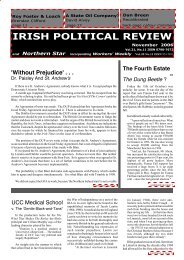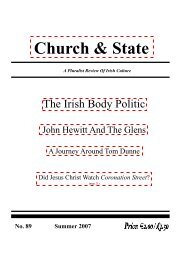Irish Political Review, March 2006 - Athol Books
Irish Political Review, March 2006 - Athol Books
Irish Political Review, March 2006 - Athol Books
You also want an ePaper? Increase the reach of your titles
YUMPU automatically turns print PDFs into web optimized ePapers that Google loves.
18<br />
of the Sinn Féin and IRA organisations<br />
in the city and how the former<br />
organisation, since the Truce, had<br />
expanded to 12 clubs with over 1,000<br />
members, many of them people “not in<br />
the firing line' during the War of<br />
Independence but now 'prepared to die<br />
in the last ditch”.<br />
"…The conference highlighted the<br />
inefficiency of the Pact from the<br />
Catholics point of view—no inquiry had<br />
been held onto [sic] the Brown Street<br />
murder gang, raiding by the Specials<br />
had not stopped and release of prisoners<br />
had not taken place. The responses to<br />
this varied from those—in the minority—<br />
willing to break the Pact outright, and<br />
those, such as Dr McRory [sic], prepared<br />
to push the demand for an inquiry 'to<br />
breaking point' but worried of the<br />
consequences for Belfast Catholics if<br />
they were seen to break it. In the attitudes<br />
expressed, both to this question and the<br />
related one of Catholic recruitment to<br />
the Specials, it revealed the east-west of<br />
the Bann divide which was to become of<br />
greater importance in the years that<br />
followed. As one delegate commented,<br />
“The Pact is all about Belfast”. While<br />
delegates from there saw no difficulty in<br />
getting their followers to join the<br />
constabulary if certain conditions were<br />
met, Gillespie from Cookstown and<br />
Healy from Fermanagh were adamant<br />
that only the Hibernians in their area<br />
would accept such an offer.<br />
"An exchange involving a Derry<br />
delegate, the prominent Sinn Féiner<br />
Patrick Hegarty, encapsulated the<br />
difference:<br />
“The IRA split last week”, he said,<br />
“and there was dread the pogrom<br />
would start once more, but inside<br />
one hour the IRA and the Hibernians<br />
and the people of Derry that are<br />
deadly opposed to each other united<br />
again. At the last pogrom in Derry<br />
half a dozen houses was all that was<br />
burned of Protestant property and<br />
that was one of the principal reasons<br />
why the city remained quiet. The<br />
Freemason Gang has more to lose.”<br />
"It was quickly pointed out by Bishop<br />
McRory [sic] and a Belfast priest that<br />
the analogy was invalid. Derry enjoyed<br />
easy access to the Free State and had a<br />
Catholic majority. “One might as well<br />
be talking about London”, McRory [sic]<br />
commented. The question was raised of<br />
how the Roman Catholic population<br />
would approach the issues of “education”<br />
and “local government” within the new<br />
constraints imposed by the Treaty.<br />
McRory [sic] had been worried about<br />
the position of St Mary's Training<br />
College. It had been largely on his urging<br />
that the boycott affecting up to one-third<br />
of Catholic secondary schools had been<br />
introduced in February. His message<br />
now was simple. “If there is any<br />
disposition not to recognise the Belfast<br />
government in this matter or in any other<br />
matter, I am quite prepared to stand out<br />
and let our people suffer on. For I<br />
understand”, he added ominously, “there<br />
is every likelihood of their being<br />
recognised in other matters”. Events<br />
behind the scenes proved him right. Lord<br />
Londonderry had already approached<br />
the Provisional Government for an<br />
accommodation on the education<br />
question. In the light of such developments<br />
Archdeacon Tierney of<br />
Enniskillen told the delegates he “would<br />
close with the northern authorities at<br />
once” if schools under the Catholic<br />
managers got the right to adopt the<br />
programme and timetables of southern<br />
Ireland.<br />
"Further confirmation of McRory's<br />
[sic] point was provided at the meeting<br />
itself in the rejectionist remarks and cold<br />
shouldering attitude of the southern<br />
ministers. For instance, on the issue of<br />
local government there was, it was stated,<br />
a limit to the extent to which Dublin<br />
would subsidise the dissident northern<br />
Councils. Despite the encouragement<br />
given to public bodies in the north to<br />
declare allegiance to Dáil Éireann, no<br />
“regular policy” had been inaugurated<br />
to deal with “local government up there”,<br />
as Cosgrave admitted. Neither “the purse<br />
of Dáil Éireann” nor that of the<br />
Provisional Government was “a<br />
bottomless one” in the changed situation,<br />
he told them. Healy voiced his feeling of<br />
grievance at this situation. “They were<br />
put out of existence for recognising An<br />
Dáil and today we hear that the Dáil<br />
recommends a policy of surrender. It<br />
may be a good policy but it is not a<br />
palatable policy”…<br />
"Despite all its reservations and<br />
objections, Dublin typically baulked at<br />
the idea of recommending that the<br />
dissolved councils be reinstated. That<br />
trenched upon the “policy of abject<br />
surrender” deprecated by Cosgrave.<br />
Instead it was to be “left to the chairman<br />
of each body” to decide. If they had a<br />
nationalist majority they would get back<br />
under the terms of the pact, O'Higgins<br />
assured them, otherwise the strategy of<br />
the Boundary Commission would be<br />
better served by leaving the<br />
Commissioner appointed by Belfast in<br />
place" (Staunton, pp57-60).<br />
"Bound up with any consideration of<br />
the position of Catholics in Belfast was<br />
the position of the IRA there. At the<br />
meeting of the Ulster Advisory<br />
Committee in Dublin in April 1922,<br />
Woods had described the Pact as<br />
agreeable to the majority of the Catholic<br />
population. Whereas during three years<br />
of war the IRA had “put up little fight as<br />
the civil population backed the enemy”<br />
the situation had changed since the Truce.<br />
As Dr Russell McNabb told it they now<br />
had the “support of the whole people…of<br />
every Catholic in Belfast and were<br />
getting along famously when the Pact<br />
came”. Commenting on the incendiary<br />
campaign against unionists' property he<br />
rhapsodised about beautiful fires in<br />
Belfast each night, asserting that the<br />
burning campaign, if coupled with some<br />
arms, would bring unionists to heel. “If<br />
they thought we were going to resume it<br />
again would be a deterrent to them” he<br />
concluded. Replying to this Collins<br />
acknowledged that Dublin had “for many<br />
good months” done as much as possible<br />
to get property destroyed, adding that<br />
“unionists thought a great deal more of<br />
property than of human life”. But more<br />
sober counsels prevailed. Mulcahy, the<br />
Minister of Defence, gave his opinion<br />
that the cost of paying for such<br />
destruction would eventually fall on an<br />
<strong>Irish</strong> government rather than a British<br />
one. Other voices, principally that of<br />
Bishop McRory [sic], also deprecated<br />
the idea. He outlined the starkness of the<br />
situation as he saw it: his flock was more<br />
dispirited, discouraged and cowed than<br />
ever before, the whole Stanhope Street<br />
district was deserted, “our poor people<br />
are huddled in the Falls area and sleep on<br />
the floor”. Large parts of Belfast, he told<br />
them, could not be entered by the IRA<br />
for the purpose of incendiary attacks.<br />
And even that policy where possible<br />
would be counterproductive. “I can<br />
assure you that if you burn houses you<br />
will intensify the slaughter and the men<br />
who do the burning will have to run<br />
away and hide”, he told them, warning<br />
that it was impossible to do anything,<br />
even incendiarism, “which will not bring<br />
down on you a terrible punishment.”<br />
Woods' testimony reinforced this. The<br />
Falls, he stated, was the only area in<br />
which a fight was possible, everywhere<br />
else in the city the nationalist people<br />
were “striving for existence”,.<br />
Volunteers faced the prospect of “dying<br />
for nothing” or getting up to 15 years<br />
imprisonment with little prospect of<br />
release. “Sooner or later”, he predicted,<br />
“we will have to clear out of Belfast”<br />
(ibid pp64-65).<br />
And now, Tim Pat Coogan:<br />
"It was open knowledge at the<br />
Committee that Nixon and company had<br />
refused to turn up for the identification<br />
parade at Brown St Barracks after Aron<br />
St. Collins proposed holding their own<br />
inquiry but Bishop MacRory told him<br />
that he would need a “regiment of<br />
soldiers” to protect such an inquiry if it<br />
were held in Belfast. With characteristic<br />
truculence Collins replied, “We could<br />
hold it all right!” He then read out his<br />
correspondence with Craig and said that<br />
he believed there would be no inquiry<br />
and that Craig would attempt to gloss<br />
over the pogrom and attempt to represent<br />
the situation as being a direct consequence<br />
of a Catholic invasion along the<br />
border. Griffith explained the dilemma<br />
of the Provisional Government:<br />
" “We're sitting here as political cockshots<br />
for our opponents and we are trying<br />
to defend the people of the North-East<br />
and our political opponents come along<br />
and call us traitors. We're quite prepared<br />
for that…and I am quite prepared to<br />
advocate the breaking with Craig and<br />
take all the consequences. I want to<br />
know your views.”<br />
"Views rather than policy were what<br />
he got. Bishop MacRory pointed out<br />
how helpless the Catholics were,<br />
hounded out of jobs and penned into<br />
their ghettoes with the Specials rampant,<br />
and suggested that if the state and the<br />
new police force were recognised to the<br />
extent of Catholics taking up the places




